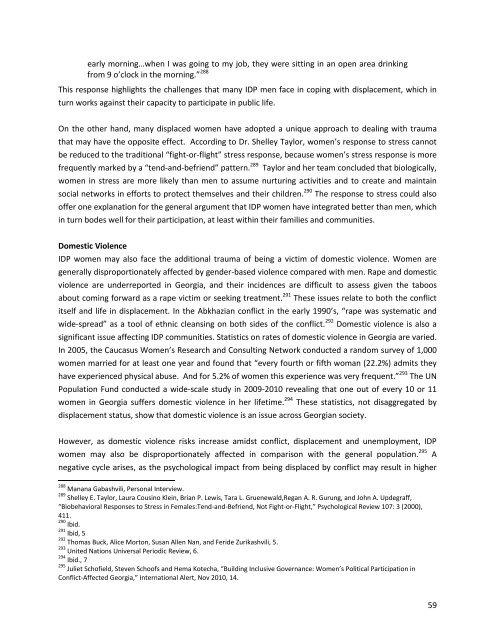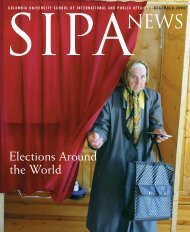Promoting IDPs' and Women's Voices in Post-Conflict Georgia
Promoting IDPs' and Women's Voices in Post-Conflict Georgia
Promoting IDPs' and Women's Voices in Post-Conflict Georgia
- No tags were found...
Create successful ePaper yourself
Turn your PDF publications into a flip-book with our unique Google optimized e-Paper software.
early morn<strong>in</strong>g…when I was go<strong>in</strong>g to my job, they were sitt<strong>in</strong>g <strong>in</strong> an open area dr<strong>in</strong>k<strong>in</strong>gfrom 9 o’clock <strong>in</strong> the morn<strong>in</strong>g.” 288This response highlights the challenges that many IDP men face <strong>in</strong> cop<strong>in</strong>g with displacement, which <strong>in</strong>turn works aga<strong>in</strong>st their capacity to participate <strong>in</strong> public life.On the other h<strong>and</strong>, many displaced women have adopted a unique approach to deal<strong>in</strong>g with traumathat may have the opposite effect. Accord<strong>in</strong>g to Dr. Shelley Taylor, women’s response to stress cannotbe reduced to the traditional “fight-or-flight” stress response, because women’s stress response is morefrequently marked by a “tend-<strong>and</strong>-befriend” pattern. 289 Taylor <strong>and</strong> her team concluded that biologically,women <strong>in</strong> stress are more likely than men to assume nurtur<strong>in</strong>g activities <strong>and</strong> to create <strong>and</strong> ma<strong>in</strong>ta<strong>in</strong>social networks <strong>in</strong> efforts to protect themselves <strong>and</strong> their children. 290 The response to stress could alsooffer one explanation for the general argument that IDP women have <strong>in</strong>tegrated better than men, which<strong>in</strong> turn bodes well for their participation, at least with<strong>in</strong> their families <strong>and</strong> communities.Domestic ViolenceIDP women may also face the additional trauma of be<strong>in</strong>g a victim of domestic violence. Women aregenerally disproportionately affected by gender-based violence compared with men. Rape <strong>and</strong> domesticviolence are underreported <strong>in</strong> <strong>Georgia</strong>, <strong>and</strong> their <strong>in</strong>cidences are difficult to assess given the taboosabout com<strong>in</strong>g forward as a rape victim or seek<strong>in</strong>g treatment. 291 These issues relate to both the conflictitself <strong>and</strong> life <strong>in</strong> displacement. In the Abkhazian conflict <strong>in</strong> the early 1990’s, “rape was systematic <strong>and</strong>wide-spread” as a tool of ethnic cleans<strong>in</strong>g on both sides of the conflict. 292 Domestic violence is also asignificant issue affect<strong>in</strong>g IDP communities. Statistics on rates of domestic violence <strong>in</strong> <strong>Georgia</strong> are varied.In 2005, the Caucasus Women’s Research <strong>and</strong> Consult<strong>in</strong>g Network conducted a r<strong>and</strong>om survey of 1,000women married for at least one year <strong>and</strong> found that “every fourth or fifth woman (22.2%) admits theyhave experienced physical abuse. And for 5.2% of women this experience was very frequent.” 293 The UNPopulation Fund conducted a wide-scale study <strong>in</strong> 2009-2010 reveal<strong>in</strong>g that one out of every 10 or 11women <strong>in</strong> <strong>Georgia</strong> suffers domestic violence <strong>in</strong> her lifetime. 294 These statistics, not disaggregated bydisplacement status, show that domestic violence is an issue across <strong>Georgia</strong>n society.However, as domestic violence risks <strong>in</strong>crease amidst conflict, displacement <strong>and</strong> unemployment, IDPwomen may also be disproportionately affected <strong>in</strong> comparison with the general population. 295 Anegative cycle arises, as the psychological impact from be<strong>in</strong>g displaced by conflict may result <strong>in</strong> higher288 Manana Gabashvili, Personal Interview.289 Shelley E. Taylor, Laura Cous<strong>in</strong>o Kle<strong>in</strong>, Brian P. Lewis, Tara L. Gruenewald,Regan A. R. Gurung, <strong>and</strong> John A. Updegraff,“Biobehavioral Responses to Stress <strong>in</strong> Females:Tend-<strong>and</strong>-Befriend, Not Fight-or-Flight,” Psychological Review 107: 3 (2000),411.290 Ibid.291 Ibid, 5292 Thomas Buck, Alice Morton, Susan Allen Nan, <strong>and</strong> Feride Zurikashvili, 5.293 United Nations Universal Periodic Review, 6.294 Ibid., 7295 Juliet Schofield, Steven Schoofs <strong>and</strong> Hema Kotecha, “Build<strong>in</strong>g Inclusive Governance: Women’s Political Participation <strong>in</strong><strong>Conflict</strong>-Affected <strong>Georgia</strong>,” International Alert, Nov 2010, 14.59

















